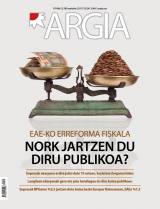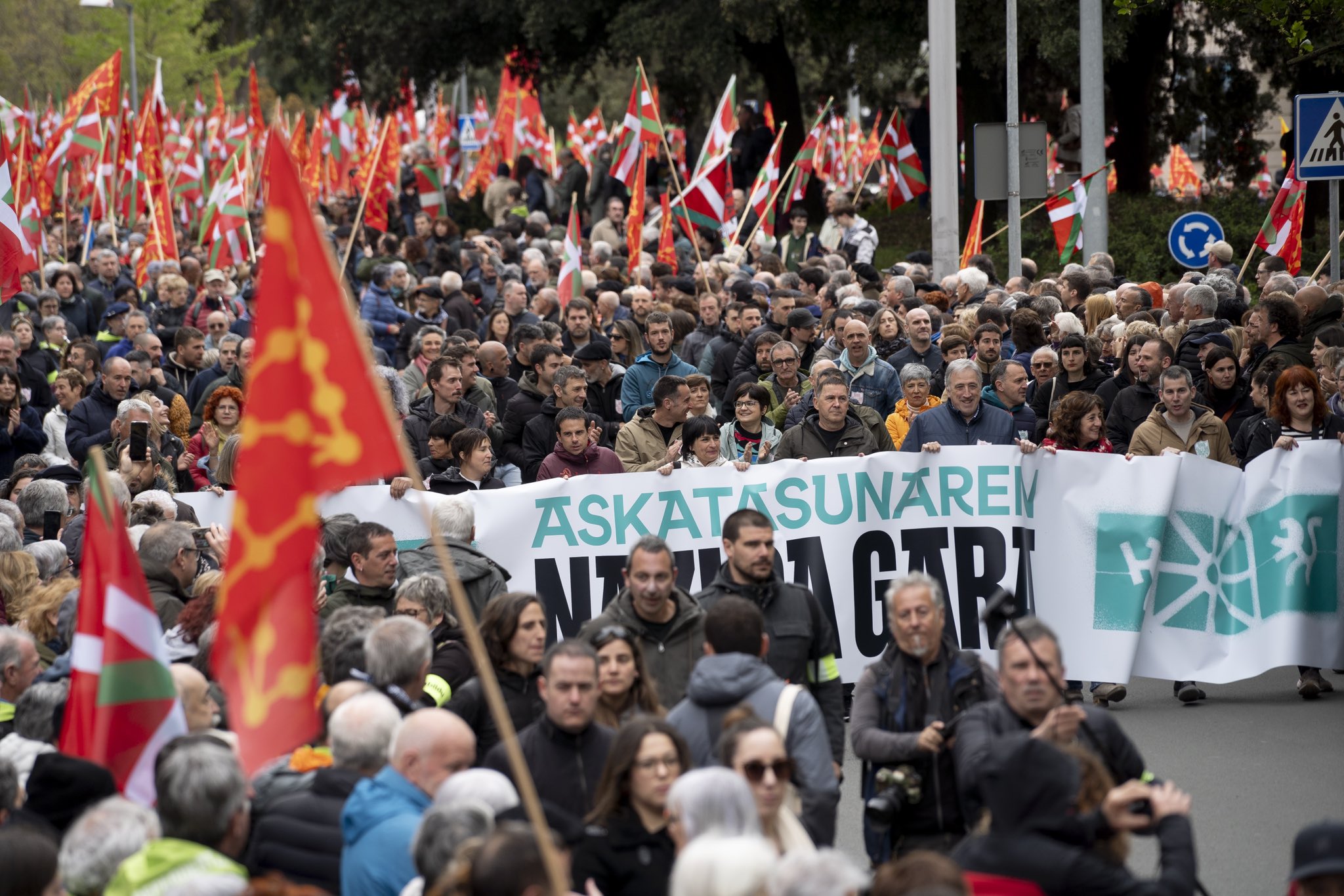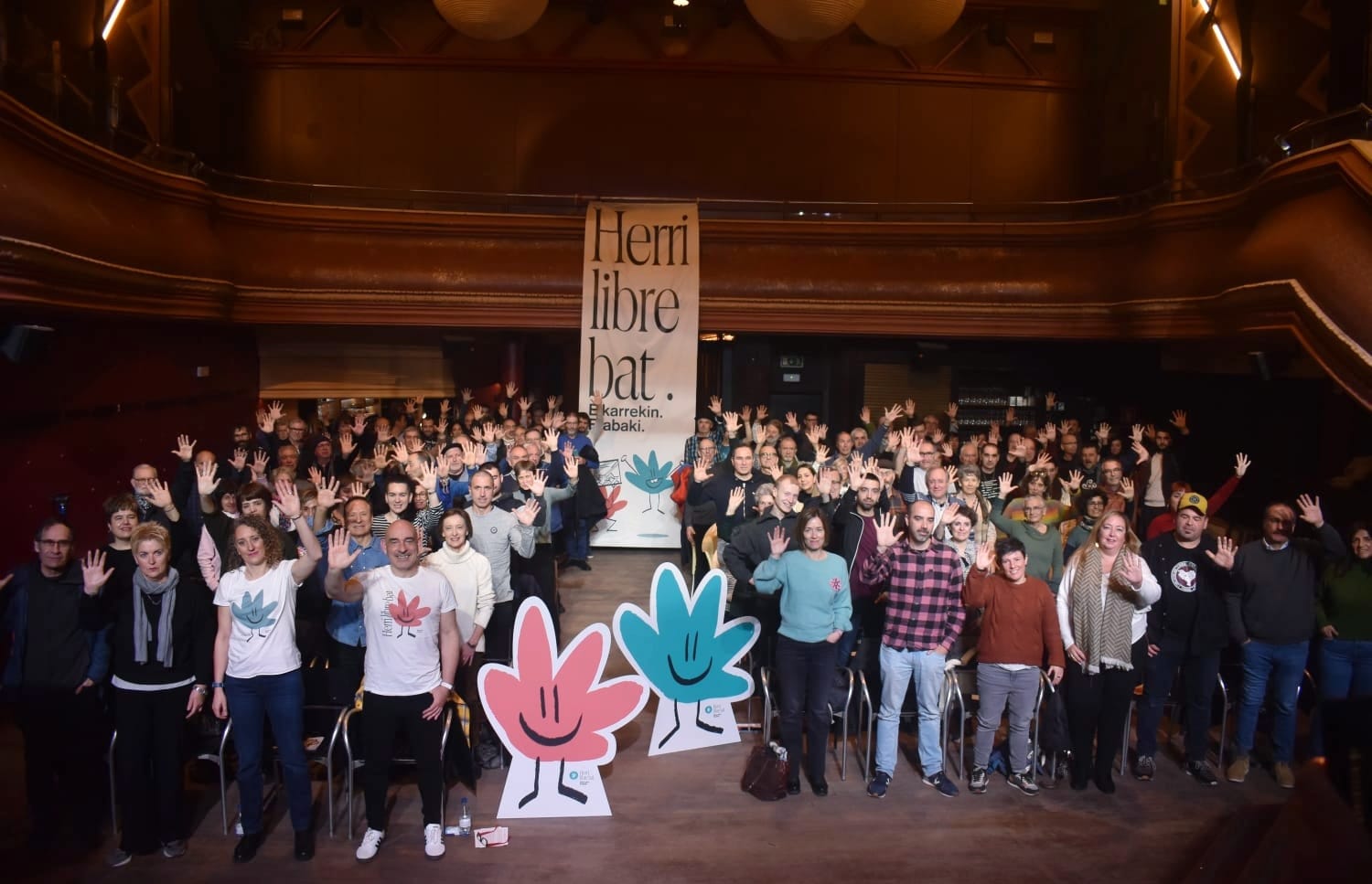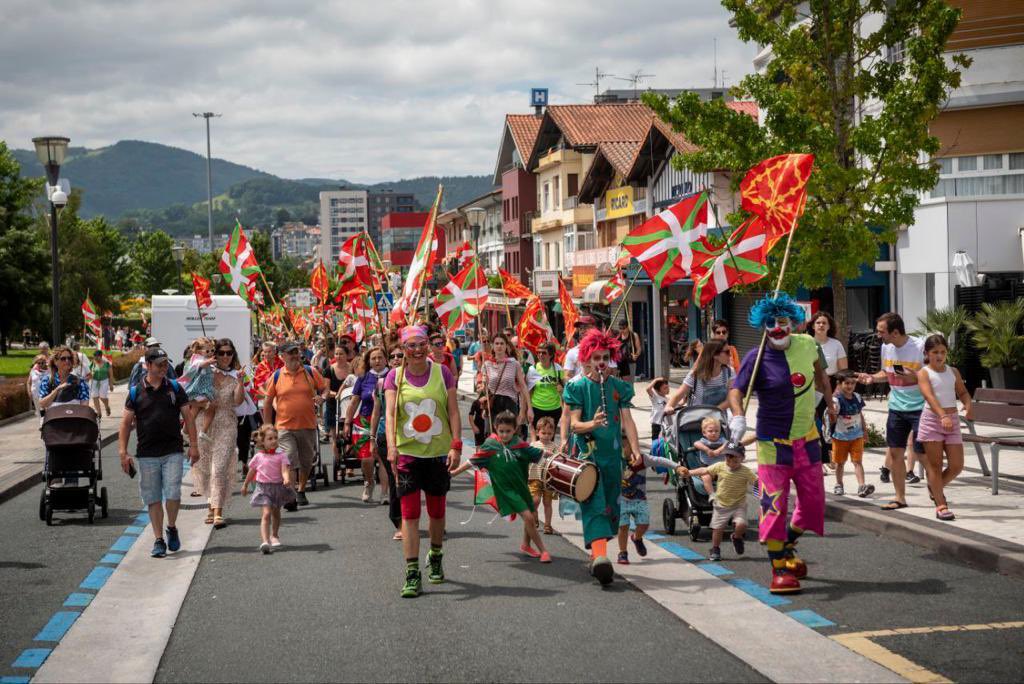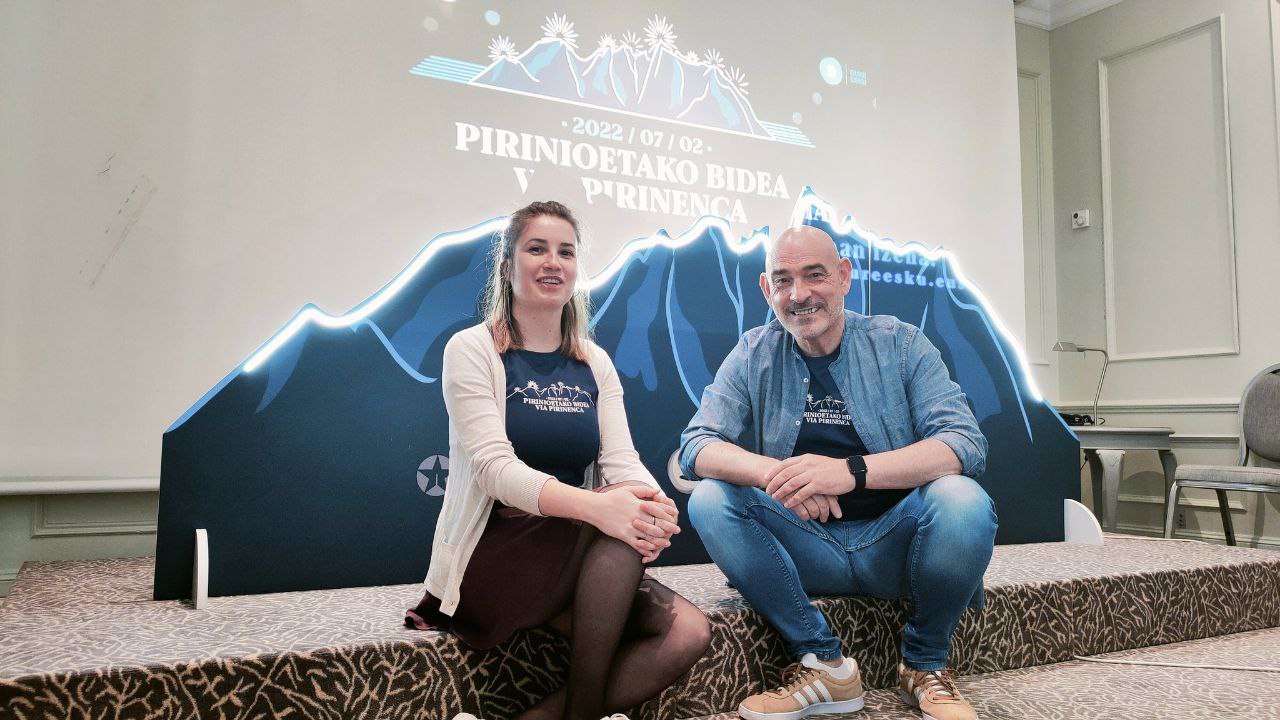"If we want to understand power, we have to also analyze the powerful."
- Julieta Gaztañaga became acquainted with the movement of Cées Esku Dago in the Basque Country of Buenos Aires, and as an anthropologist who studies politics, he would like to pull the rope. Well, well, the anthropologist's curiosity has brought Euskal Herria, in these times when the struggle and debate about the right to decide are on the surface.
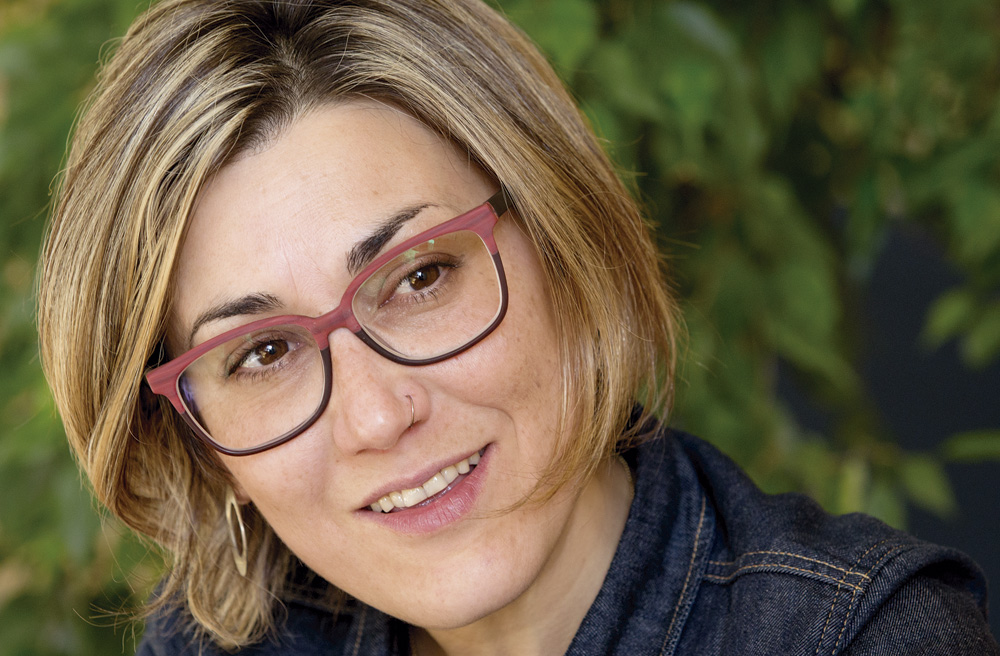
Antropologoa. Buenos Aireseko unibertsitatean ikasi zuen eta bertan jardun da ikerlari eta irakasle azken hogei urtean. Peronismoko lan politikoa eta militantzia aztertu ditu, eta, gaur egun, Gure Esku Dago mugimenduari buruzko landa-lana egiten dabil buru-belarri.
Why did she study anthropology?
It gives me a little shame to confess this, but I've already shown a great commitment to anthropology and I think I can say: I studied anthropology by Julio Cortázar. He's my favorite writer, I know by heart some of his stories, and he had a story, For a pocket anthropology, and, I don't know, it seemed like an enigmatic semi-absurd. In school, we had never learned anything about anthropology, no one in my family was in it, so it was an enigma.
And in Cortázar's story, what was anthropology like?
The truth is that it speaks of softening in this story. It is a very good text, it has many political nuances, albeit unintentionally. I read it at the age of 15-16, and I only took the playful part of it, but I explained that people who see everything soft can soften things and vice versa. It's a very short story, one of those annotations that Cortázar wrote. In any case, the story shows how anthropology looks at the world, not so much as an anthropological discipline.
How does the anthropologist look at the world?
With great curiosity and respect. I really like this other concept: interpretative charity. Take seriously what people do, what they say, what they feel: respect the experiences. Now, from my thought, I think that was precisely what was reflected in that text, the humble curiosity for the experience of others.
And in the eyes of the anthropologist, where does the curiosity to analyze politics come from?
It has something to do with my personal story. My family was the victim of political violence in Argentina, my parents were kidnapped during the last military dictatorship and, as a result, the topic of politics was very present in my most intimate environment, but there was no talk about it, and I and my brothers have always lived with that fear ever since we were young. It was a very subtle thing, there was no explicit threat, but politics generated a desire and a fear.
On the other hand, at the beginning of my studies, I taught the subject of political anthropology with Mauricio Boivin: he became my mentor, he addressed my undergraduate and master's thesis, and I started my studies and entered his research team in the second year. The two members of this group worked a lot, not only political anthropology, but political anthropology, aspects they studied, movements, militancy, leadership… My interests, the enthusiasm of my mentors and the meeting of a very beautiful group, that linked me to everything.
If I am not mistaken, you have examined Peronism.
Well, I've worked on concrete political projects, for example, in my undergraduate thesis I studied the construction of a very large infrastructure project, a bridge that they had to build between two Argentine cities, on the Paraná River. This project was promoted by the peronists of the province of entrerios. In another study, I studied a process of regional integration, also driven by peronists from different provinces.

How do these types of research influence?
Anthropology is often linked to the work of giving voice to those who do not have a voice, a prejudice that sometimes hurts our field, because, as many members have said, we also have to analyze the powerful to understand power, and not just those who are affected by that game. I, in general, have done fieldwork with the powerful, also with the militants, but the goal has been to see how great politics is done on the statesman scale. These studies have served me to bring to anthropology issues that supposedly did not correspond to anthropology. And to take away the prejudices, because they're often glasses that keep us from understanding processes more deeply.
What prejudices are these?
I'm going to give you a very simple example: we think politicians do infrastructure just to take a picture later. There are many other reasons for building a particular infrastructure. The reasons may be better or worse, but we often don't investigate them, because we've believed in advance that the only goal of these studies is to photograph, and that prejudice is not just political and ideological, but it's a conceptual prejudice. If, in advance, I consider that the infrastructure in question has been made purely cynical, as a result of purely instrumental calculations, I will not go into the analysis of other reasons, for example, why this infrastructure has been made and not another. In fact, before building the infrastructure, there have been fights for economic resources, and because of my prejudices, I'm not going to have any news of them.
It uses a methodology called participatory observation. What is that?
Participatory observation means not being someone outside, as if it were a lab facing people. It means watching people, yes, but participating. It was long believed that it was possible to be an objective observer, but this belief was long denied.
Day-to-day is also very important, right?
Yes, you have to be present in the space in question, day by day, in the space of militancy or in the campaign... It is urgent that you get the trust of others and trust yourself, and to achieve it participative observation is essential, which cannot be achieved with an interview, even if it is an excellent interviewer, there are elements of speech, experiences, situations... and all of them show you the quotidian, routines, sometimes boring.
He has also worked on the Basque diaspora in Argentina. Looking at your surname sounds logical, but interest doesn't come from home, right?
I only have a Basque surname, and in Argentina we always get bad. It's not a hard last name, but it's usually confusing and we've gotten everything but right. Then, due to the confusion of the last name, the father explained to us that it was a Basque surname, but it is, he told us nothing more, he never led us to an Etxea Basque, because he does not believe in those things. I learned about the Basque world through my friends, when I was very young, and then I started learning Basque because I had a linguistic and anthropological interest in that language.
Where have you been learning Basque?
In an Euskaltegi named Euskaltzaleak. Euskaltzaleak is an Etxea Basque, but she is not an Etxea folkloric Basque. It is special because it is an Euskaltegi and the love for the Basque world is closely linked to the love of language, in a political sense. That’s why, perhaps I thought I could include this new field in my anthropological research, because, although it’s completely different from Peronism, vascophiles are related to political values, to commitment, to a certain militancy… So I started researching what is called the Abertzale Left of the Diaspora.
How did Euskaltzaleak emerge and what kind of people usually meet?
Euskaltzaleak was born in the Basque Country Etxea of Argentina, inside the house Laurak Bat. The Laurak Bat Basque Centre is the oldest Etxea Basque in the world and will soon be 140 years old. In any case, Euskaltzaleak has since its inception been an independent institution, the physical headquarters of which was established five years ago. The Basque Country is very plural in terms of gender and social level, and there are people with very different political options. Despite the confluence with Basque nationalism, as an Argentinian, the partners are situated in a very different way, and that is very interesting, because there are many indigenous ideologies. As Euskaldunization is very important, there are people who do not have Basque ancestors, but who have come closer because they are interested in language.

In Buenos Aires he began to explore the movement Tours Esku Dago (GED).
Yes. We saw in the Basque Country the documentary Gazta zati bat, and I was stunned, reminding myself of my thesis about political work, even though it was a completely crazy and very general comparison. This way of doing handmade politics, person-to-person... brought me an echo. Then I started reading about it, and by that time, the members of the GED movement participated in the activities that would join the entire diaspora, and it seemed to me that it could be a good case to investigate. In the Argentine Basque diaspora the whole political spectrum meets, from right to left, and I found it surprising that everyone agreed, because when they talk about Argentinian issues they discuss everything.
Why will it be?
I say this, by my name and surname, but I think everyone was in favour because there are still no binding options, I would like to see what would happen, for example, if a consultation were organised. In any case, I find it very significant, and that is why I would like to emphasise that no one has rejected it or, at least, no one has made it public. It seems to me as significant as that vague support that no one has rejected it. Here, for example, it has been rejected.
And suddenly you decided that not only did you want to study the Argentine movement, but also that of here…
I thought it was necessary, I realized that I lacked many things: I did not know other popular movements, how they are linked or not to the GED, what the political network of parties is like, not only the left Abertzale, but the government, how the relationship between the government and the state lives here... In the diaspora, it only comes to us through the media, and although I was interested from the beginning to know the current situation, it was essential. So I asked for a scholarship, they gave it to me, and here I am. I arrived at the end of September, and I will return to Argentina in early March.
You've come to the climax.
Yeah, really. If I had searched for the historical moment I wouldn't have touched me, and look! The situation in Catalonia is a mirror, a mirror that reflects the Basque process, in two ways. As soon as I arrived I had to decide if I would go to Barcelona, and in the end I decided to stay here and see how the Catalan process lived here. I am living the process at two levels: on the one hand, in the plan of great calls and demonstrations, and on the other, in daily life, how to talk about the theme in the bar or in the neighborhood assembly, how the versions of the song L’estaca are created and sung… I also want to analyze who and when it is calm, when people go out to the street, for example, when they unjustly imprison the lists of future cultural and political confusion. I want to see how the procés process is being, what is understood and what is not, I think it is very present here, we do not know what will happen in Catalonia, and it is very related to the Basque process, we do not know how it will be, if it is going to be, if it is going to be a great referendum of that kind, if it is going to be the time, if it has already gone, if it is now… I think it is a good place to think of all that.
Bi hilabete egin ditu Gaztañagak Euskal Herrian, eta oraindik egonaldiaren erdia baino gehiago geratzen bazaio ere, egin du aurrerapenik: “Galdera berriak eraikitzen hasi naiz, han ez neuzkanak, eta horixe da lehen urratsa. Espero dut erantzun ahal izango ditudala, baina edonola ere, gauza handia da inoiz okurritu gabeko galderak topatzea edo aurrez uste izandako gauzei buelta ematea. Orain jakin-minez nago, ea zer gertatuko ote den abenduaren 21ean Kataluniako hauteskundeekin eta zer eragin izango duen horrek hemen”.
Frantziako itzuliak duen nazioarteko oihartzuna baliatuko du Gure Eskuk, 'Euskal Herria mundura' izeneko ekimenarekin. Tourreko lehen hiru etapak osoki Euskal Herritik pasako direla baliatuta, "inoiz egin den ikurrinik erraldoiena" zabalduko dute, eta 4.000... [+]
In this photo you can see the txamantxoia or LED spotlight of great power near the top of Mazeko (Belagua) adorned with flag and ikurriña of Navarra. It's powered by a three-battery system that you can see several kilometers in the evening. On 2 July, in the Via del Pirineo... [+]









